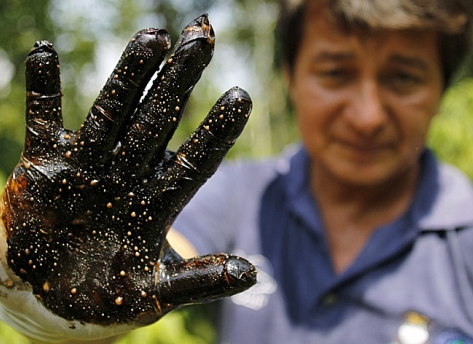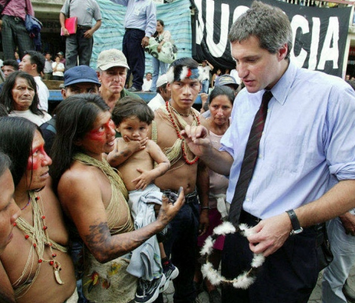Legal battle between Ecuadorian villagers and Chevron Oil continues in Canadian courts
A legal battle between Chevron and Indigenous villagers from Ecuador, spanning several decades and across three countries, is now playing out in Canada as Ontario courts consider whether to enforce foreign judgments here.

Environmentalist Donald Moncayo holds up an oily hand.
In 2011, Chevron Corp., the third-largest oil company in the United States, was ordered to pay $9.5 billion by an Ecuadorian court to compensate 30,000 Indigenous villagers living in the Lago Agrio region of Ecuador for environmental damages.
The villagers claimed Chevron was responsible for extensive environmental damage caused by oil-drilling activities by Texaco, Inc., which ended more than 20 years ago and before Chevron acquired Texaco in 2001.
Ecuadorian judgment
In 2011, Chevron was found guilty for the dumping of billions of gallons of oil and toxic waste into the Ecuadorian Amazonia region, where Texaco operated for 25 years.
Chevron hasn’t operated in Ecuador since 1992 and no longer has assets in that country, so the plaintiffs went to a U.S. court in order to have the judgment enforced.
However, Chevron filed suit against the plaintiffs and their legal team in the U.S. under the Racketeer Influenced and Corrupt Organizations Act (RICO), alleging that the Ecuadorian judgment was obtained through corrupt means.
A Southern District of New York court ruled in 2014 that the Ecuadorian judgment was a product of fraud and racketeering activity, rendering it unenforceable in the U.S.
Meanwhile, in 2012, the Ecuadorian plaintiffs filed a lawsuit against Chevron Canada in Ontario — part of a planned series of lawsuits in several countries where Chevron has assets. The Ontario Supreme Court ruled in January of this year that the plaintiffs could not collect payment from Chevron Canada because it was a separate entity from Chevron Corp. However, it ruled that the plaintiffs could still proceed against Chevron Corp.

Attorney Steven Donziger meets with Ecuadorian villagers.
Chevron then requested the plaintiffs pay a $1-million security fee to cover anticipated costs before the case proceeds. That was approved by the court, but an appeal of the ruling will be heard Oct. 10 at the Ontario Court of Appeal in Toronto.
Chevron disputes the original judgment from Ecuador and says it shouldn’t be enforced in Canada.
U.S. district judge found Ecuadorian judgment fraudulent
Chevron spokesperson Morgan Crinklaw pointed to the 2014 RICO decision and said the plaintiffs’ legal team committed “serious and significant crimes,” such as bribery, witness tampering, obstruction of justice, wire fraud, and mail fraud.
“This [lawsuit] was a scheme. [The plaintiffs] were hoping that Chevron would just settle and pay them out,” said Crinklaw.
“In the U.S., the Ecuadorian judgment is fraudulent and cannot be judged. It’s a fact, the courts found it to be so,” he said.
“Since they can’t enforce it in the United States they are going to other countries around the world to try to enforce it.”
The Lago Agrio legal team has also filed applications to enforce judgment against Chevron in Brazil and Argentina, in attempts to gather the multi-billion dollar settlement.
Steven Donziger, a New York-based human rights lawyer who is leading the case against Chevron, says that Chevron has used heavy-handed tactics in fighting the case.
Donziger alleges he has been the target of colossal economic power from a single corporation directed against an individual.
“They sued me for $60 billion before dropping all damages claims to avoid a jury in the RICO matter — the largest amount an individual has been sued for in the history of the United States,” he said.
Chevron maintains it is not responsible
Ultimately, Chevron reiterates that it is not responsible for the damages caused by the pollution in the Amazon.
“This group of American trial lawyers and others are trying to use Canada’s judicial system to enforce a fraudulent and illegitimate Ecuadorian judgement,” said Crinklaw.
Chevron asserts Texaco did its part to clean up oil-waste pits and other environmental damage. In 1995, Texaco signed an agreement with the Ecuadorian government and agreed to clean up the waste, and in return was released from any further liability.
However, Donziger said Texaco’s cleanup was inadequate and that its workers merely pushed dirt over leftover waste pits.
According to reports commissioned by the plaintiff’s legal team, higher than normal cancer rates are on the rise among villagers living in the Lago Agrio area of Ecuador.
The lawsuit represents 30,000 claimants who say they have been affected by pollution from the leftover oil fields. Many don’t have access to clean drinking water due to contamination. The plaintiffs were not signatories to the agreement made between Texaco and the Ecuadorian government.
Crinklaw said Texaco’s former partner in the oil production industry in Ecuador, the state-owned company Petroecuador, is responsible for the remaining reclamation.
“The people of Ecuador and the trial lawyers claiming to represent them should be pursuing Petroecuador and the government of Ecuador for their responsibility for cleaning up whatever exists on the ground today,” said Crinklaw.
But Donziger insists Chevron is using stall tactics to avoid paying what is owed to the plaintiffs who have long awaited compensation. He says the $1-million security order is unjust as the already poor villagers do not have the money to pay it.
“Remember, we won the case [in Ecuador],” said Donziger.
“It was affirmed by Ecuador’s highest court.… All we are doing now is collecting the judgment against a scofflaw debtor trying to run from the law. Chevron cannot, in Canada, relitigate issues it already raised in its preferred forum of Ecuador and lost.”
______________________
Credit: Canadian Broadcast Corporation, www.cbc.ca





















